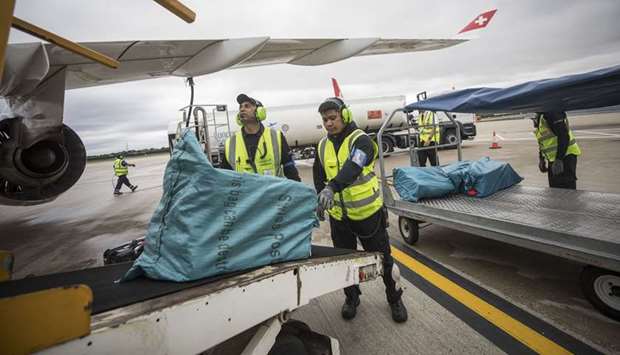The movement of cargo flights carrying vital medical supplies and other necessities is absolutely essential as the world fights a common, invisible enemy — the coronavirus.
Governments around the world have clamped effective measures to contain the spread of Covid-19.
Border closure, travel restrictions, social and physical distancing and self-isolation are now being implemented globally in containing the highly contagious viral attack.
Undoubtedly, air cargo operations are an essential part of the fight against Covid-19.
While about 90% of global trade is carried by sea, Bloomberg says air cargo transports in excess of $6tn worth of goods annually and accounts for about 35% of the trade by value.
In normal times, about half of the world’s air cargo is transported on dedicated freighters and the rest goes in the bellies of passenger aircraft along with people’s baggage. Airlines have increasingly relied on passenger planes to transport cargo since the global financial crisis.
Airlines could lose $252bn in revenue from passenger operations this year because of the pandemic, according to the International Air Transport Association.
While it won’t be enough to salvage the fortunes of airlines — earnings from cargo operations — perhaps this year, will certainly help them narrow losses from the collapse in passenger operations.
A coordinated approach among governments is necessary to keep air cargo flowing, experts say. IATA has pointed out that delays in permit approvals, quarantine measures for air cargo crew and insufficient support on the ground continue to hamper the movement of cargo flights globally.
The global trade body of airlines have also called for measures including the removal of slot restrictions and operating-hour curfews, and exempting crew who don’t interact with the public from 14-day quarantine requirements.
Since the Covid-19 crisis began, air cargo has been a vital partner in delivering the much-needed medicines, medical equipment (including spare parts/repair components), and in keeping global supply chains functioning for the most time-sensitive materials.
This has been done through dedicated cargo freighter operations, utilisation of cargo capacity in passenger aircraft and with relief flights to affected areas.
Air cargo is also instrumental in transporting food and other products purchased online in support of quarantine and social distancing policies implemented by states.
However, the dramatic restrictions on non-essential travel and collapse of passenger demand have severely limited cargo capacity across the globe.
“Airlines are providing as much capacity as they can,” points out Glyn Hughes, IATA’s Global head (Air Cargo). “Governments need to step up to ensure that vital supply lines remain open and efficient and that there is adequate infrastructure and support available in the air and on the ground.”
Many governments and international regulatory bodies are facilitating the movement of air cargo. The European Commission (EC) has issued Guidelines on Facilitating Air Cargo Operations during the Covid-19 Outbreak.
The World Customs Organisation (WCO) has implemented a series of emergency contacts to ensure cargo border blockages can be responded to immediately, and the International Civil Aviation Organisation (ICAO) has issued a series of state letters urging member states to further facilitate air cargo flows during this time of crisis.
But there are still too many examples of delays in getting charter permits issued, a lack of exemptions on Covid-19 testing for air cargo crew, and inadequate ground infrastructure to/from and within airport environments. Air cargo needs to move efficiently throughout the entire supply chain to be effective.
Obviously, the measures that governments have introduced to restrict travel are shrinking the size of passenger operations.
That is also removing significant cargo capacity from the system — capacity that is vitally needed to help keep supply chains going, including the delivery of critical medicines and medical equipment.
“What has unfolded since is a story of two halves. The disruption of global supply chains led to a fall in demand. But the dramatic disruption in passenger traffic resulted in even deeper cuts to cargo capacity. And the industry is struggling to serve remaining demand with the limited capacity available,” points out Alexandre de Juniac, IATA’s director general and CEO.
“We only got a first glimpse of this in February. Among all the uncertainty in this crisis, one thing is clear — air cargo is vital. It is delivering lifesaving drugs and medical equipment. And it is supporting global supply chains. That’s why it is critical for governments to remove any blockers as the industry does all it can to keep the global air cargo network functioning in the crisis and ready for the recovery.”
According to Hughes, airlines need access to alternate airports along all routes to keep cargo flights operating safely.
“These alternate airports are where aircraft can land in the event of an emergency during flight. Because of the sharp drop in passenger flights, some airports that serve the critical alternate airport function are closed or not available at all times. A coordinated effort by governments to keep alternate airports operational is needed. If not, the global air cargo network cannot function and vital shipments are at risk,” Hughes noted.
Governments around the world should consider exempting cargo crew from quarantine rules that apply to the general population and ensure there is adequate staff and facilities to process cargo efficiently.
The authorities concerned should also cut the paperwork for charter operations to ensure that essential cargo keeps moving.
People may have put off their travel plans due to the coronavirus, but they cannot stop buying. For this reason, global trade has to go on.
A key driver of global trade is air freight. Therefore, it is essential that nations around the world ensure vital cargo supply lines remain open and efficient.
* Pratap John is Business Editor at Gulf Times. Twitter handle: @PratapJohn

Ground crew move cargo from a passenger aircraft at the London City Airport (file).

